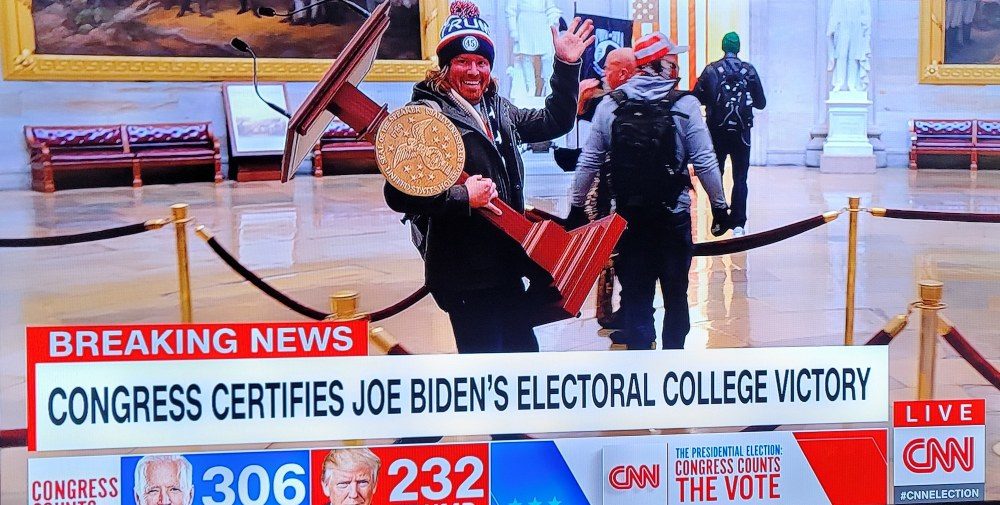One of the terrible losses of the Jan. 6 attempted coup is likely to be dramatically increased security at the Capitol, much as happened to airplane travel after 9-11. The capitol building is an invitation to invasion, by original design.
When “the people’s house” was built, in stages, it was designed to be informal and open, stately and rough, an emblem of democracy. It was easy for strangers to wander in, take a seat at a member’s desk, pocket souvenirs, accost an official for a favor, and pack the visitors’ gallery for watching the oratorical show below. Reporters had a press gallery with a good view of the chambers and could roam the halls and button-hole sources. The air was thick with the pungent odors of cigar smoke, whiskey, sweat, and spitoons. Much of the same populist permeability pertained at the White House.
That’s now likely lost, along with our innocence about the possibilities of violent resistance to democratic developments that enrage a section of the citizenry. Armed presence and high security will now be ugly visual features of the capitol, as in authoritarian countries.
Another possible casualty could be the dangerous time after a president has lost in the November election and the time of inauguration. One historic example of this was 1860-61 in the waning days of James Buchanan before the untested and widely distrusted Abraham Lincoln could take power — days when the chances of avoiding a Civil War were squandered.
Buchanan, a shy man of strong Southern sympathies, sank into a funk during this interregnum, lost all respect, and floated ridiculous ideas for surrendering to the South’s demands. “Is there any way to take control of the affairs of government out of the hands of that old imbecilic president?” asked Ohio Sen. Benjamin Wade, in words that echo loudly today. That was the danger of powerlessness. Trump has shown the danger of insurrection, of an attempted coup d’etat.
In private life, the uncertain time of replacing a psychologically unstable leader with a new choice usually requires steady guidance from the board. That equivalent would be Congress or the wise heads of the civil service bureaucracy, as in Britain. Another idea would be to shorten the interim period, as happened in 1937 when the inauguration day was shifted from March 4 to January 20.
A last observation, also from history. Washington Sen. Warren Magnuson, voted out peacefully in 1980, used to advise negotiators on his behalf always to “leave a back door,” meaning a way for the losing side to save face, to gain a small concession, and to be treated with respect. Now that enabling Republicans are belatedly recognizing the dangers of Trump and scurrying back to political safety, it might make more sense to welcome them (and their supporters) than excoriate them for past sins. “With charity for all” might well be a slogan for the incoming President. History teaches hard lessons.
Discover more from Post Alley
Subscribe to get the latest posts sent to your email.

Trump has done wonders for the memory of James Buchanan. As for the enablers, it seems like some sort of graduated response is necessary, as in the TV show “The French Village” a few years back, which dealt with the dilemma faced by a small village after Allied liberation. Its close-knit prewar citizenry exhibited all shades of gray behavior during Nazi occupation. Clearly some were heroes and some were monsters, but many were in between, or some of each. We’ve got that going on now. “Hang them all” isn’t a just solution, but neither is “Olly Olly Oxen Free.”
David Leonhardt notes the dangers of a long period between election and taking office, quoting one expert as saying it’s the “most mischievous” feature of the constitution. The lengthy period before inauguration (now 2.5 months) was originally installed because of the time it would take members of Congress to travel to D.C. in winter weather. Most countries have very short interim periods: Britain’s is one day; Japan and France and Canada just take a week or so.
Sorry, I omitted the link to NY Times item on inauguration delays: https://www.nytimes.com/2021/01/08/briefing/elaine-chao-trump-capitol-neil-sheehan.html?